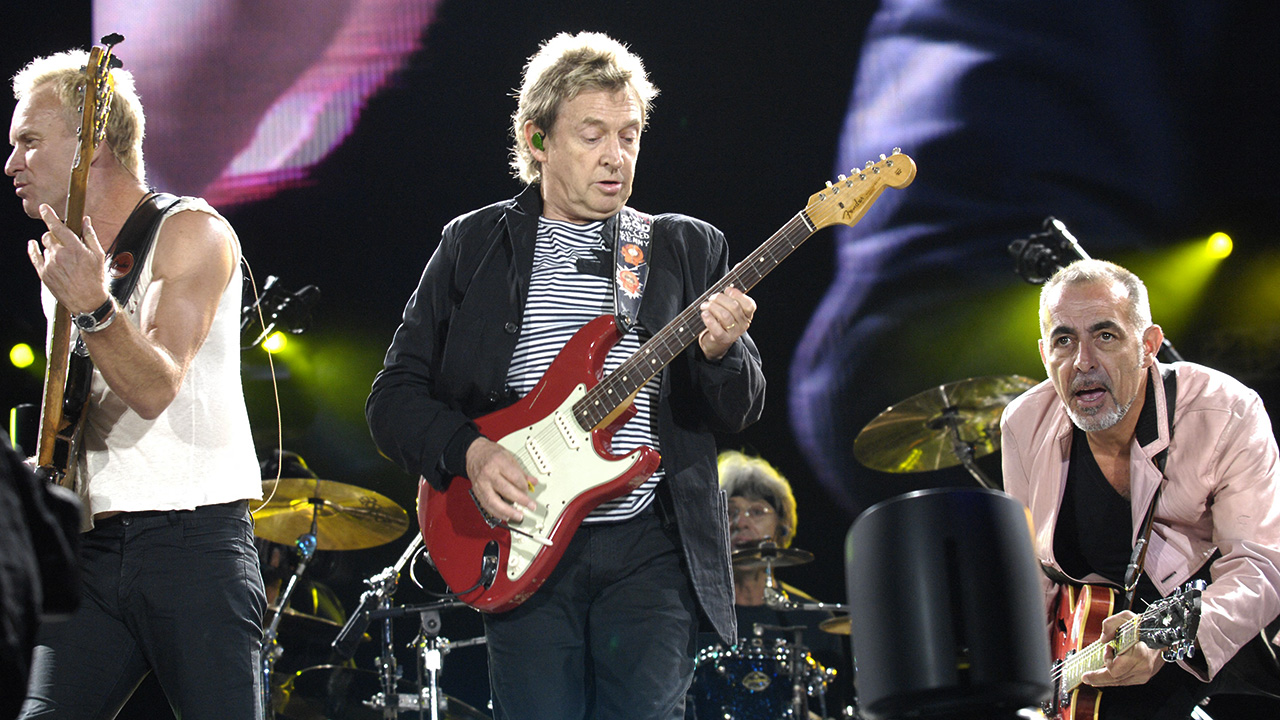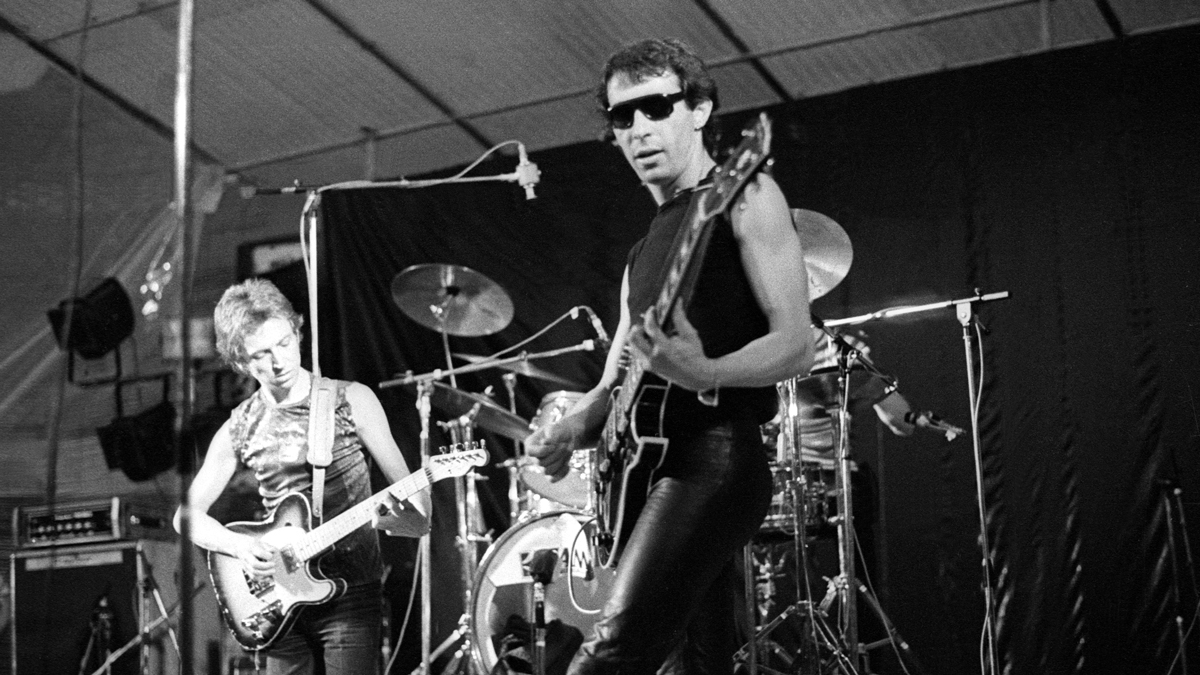
In July of 1977, 35-year-old Andy Summers was recruited by Sting to join The Police, who had formed only months prior, after Sting had coupled up with American drummer Stewart Copeland and French-born, punk-leaning guitarist, Henry Padovani.
With Padovani in the band – as evidenced by his only recorded and released material, 1977’s Fall Out/Nothing Achieving – the sound of The Police was grittier and more in line with the emerging London punk scene from which the band hailed.
While Copeland fancied this direction, complete with Padovani’s in-accordance licks, Sting had other ideas – further amplified when he met Summers through Gong’s Mike Howlett in the spring of ’77. The connection was immediate, and Summers’ experience (he was 10 years their senior) and access to much-needed money didn’t hurt, either.
Long story short, and much to Copeland’s chagrin, Sting ousted his close pal from The Police after a particularly tense studio session with the Velvet Underground’s John Cale, which showed that a band featuring both Padovani and Summers would never work.
Thinking back on his expulsion, Padovani says, “Things had been good; now there were arguments. At the last gig we did in Mont de Marsan, Andy and I argued about an amplifier and who would use it. I let it go and let Andy use the ‘good’ amp.”
Keying in on the session that ended his tenure, he says, “After that gig, we found ourselves in the studio with John Cale, recording Visions of the Night. John had an argument with Andy about the solo because John wanted me to do it, but Andy argued that he was a better player. And then John let Andy do it, but insisted that Andy do it with my guitar and use my amp. It was horrible.”
As devastating as it must have been, it’s hard to argue with Sting’s decision. And it’s not as if Padovani didn’t go on to have an interesting career – he soon settled in with Wayne County & the Electric Chairs before forming The Flying Padovanis.
Things had been good; there were now arguments. At the last gig, Andy and I argued about an amplifier and who would use it
All in all, things turned out well for everyone involved, with Padovani even remaining friends with Copeland and Sting – though he never really did cozy up to Summers all that much – to the point of a brief 2007 reunion within a reunion, while The Police were in Paris.
Often these stories end badly, but not this time. Sure, Padovani might have co-founded The Police, and the band sure did soar after he departed, but he’s alright with it. He gets it. And now, he’s on to other things: “These days, I’m not stuck with a guitar all the time,” he says. “But I do have my studio at home – with computers, of course, but also with an analog tape recording. And a great analog board.”
He adds: “I do record demos, and I keep writing. I have tons of songs in process. Whether I finish them or not I do them as I feel. My life is different, and when an album is finished and mastered, I’ll give it away for free on my website. And if I gig, I will sell my albums at the concerts.”
How did you first meet Stewart Copeland?
“I met Stewart through a friend, Paul Mulligan, maybe the day after I arrived in London. He was cool and friendly, and he told me he wanted to form a punk rock band. He took me to The Roxy to see The Damned, which was my first punk scene experience. The next day, I shaved my beard, cut my hair and was all punked out.”
And how did that lead to forming The Police?
“Stewart realized I would now stay in London longer than just a few weeks, like I’d planned. He asked me to join his band and told me he was auditioning a bass player who was coming in from Newcastle. So I did.”
I assume that bass player was Sting.
“Yes. He instantly played well on the songs that Stewart and I had put together. Since we were the only musicians he knew in London, plus the persuasive attitude of Stewart, he said yes to the band.
“He was confused – he felt that he had to forget all he had learned musically and instead scream, jump around and play fast. But he gave it a try because Sting is a guy who always keeps his options open. And in that moment, he had nothing else.”
How did The Police sign with Illegal Records to record Fall Out/Nothing Achieving?
“Illegal Records came along specifically to put out our first single. We got the name ‘Illegal’ as a reference to the band’s name, The Police. It was Paul Mulligan – me and Stewart’s friend, who I was living with – who put up the money for the recording at Bazza’s Studios.
“We did it in one afternoon on the cheap, then we got sleeves printed and went to shops to try and sell it. So Illegal Records was nothing but us as a four-person operation!”
What gear did you use?
“At the time, I was using my Jacobacci Sacha Distel [a guitar inspired by Gibson’s ES-175], and I played that through a Fender Twin Reverb. Also, Stewart played some guitar on that, and he used his Gibson SG through my Twin Reverb, too.”
How did Andy Summers enter the picture?
“The whole thing happened when Mike Howlett [ex-Gong] asked Sting and Stewart to be part of a project he was doing in Paris, where other ex-members of Gong were also a part, and so was Andy.
“They got along, and after that we had a few gigs in London, and Andy joined us for them. He was a great guitar player, 10 years older than the rest of us. With him, the band would head in a different direction.
We met when we were not in the same frame of mind. I was discovering new freedom and didn’t care much. Music was not at the top of my priority list
“Andy was good, but the vibe was different, and it became apparent that there was a Stewart-and-me camp and a Sting-and-Andy camp, both going in different directions.”
Could Andy and you have co-existed, given time and the chance?
“He had years of playing under his belt, and I hadn’t been playing for too long compared to that. He also found a sound within The Police, and The Police are the best thing that could have ever happened to him. He was a good guitar player, working with many musicians before – but he did not have a sound, even though he’d been playing for so long.
“We met when we were not in the same frame of mind. I was discovering new freedom and didn’t care much. Music was not at the top of my priority list.”
What led to you leaving The Police?
“After the session with John Cale, Sting and I went to my place, and he told me the next gig in Germany would not include me. But such is life. Everything had a good end, and The Police went to blow away the world. It was all for a reason.
“I was finding my identity and had not found my sound or playing style. Andy was old-school and older, so we’d argue about everything. Sting didn’t know much about that stuff, but Andy had a pedigree, and they shared a viewpoint on what ‘good’ music was. Andy had money, which meant, for Sting, that the situation was right.”
Is it true Andy issued an ultimatum that it had to be him or you?
“Perhaps he did, perhaps he didn’t. But the split cannot be boiled down to a problem between Andy and me. Those three became the biggest band in the world, and so whatever happened was the right thing to happen.
“All that happened is part of that success. I always felt I was part of it in a positive way, but all I know is what Sting told me that night after the John Cale session. Andy brought something to the table: money was to be made, and Sting told me the concept. I got it right away and went back to see my family.

“If there was an ultimatum, it wasn’t made to me. But maybe Andy didn’t want to confront me. Maybe it wasn’t for him to do. I never held resentment. With The Police, Andy found a great sound that he never had before.
“And when they split he found himself a bit lost, having a style that he could only play with The Police. Sting found himself a player in Dominic Miller, who can play like Andy, which is why he’s played with him for so long.”
Did you remain friends with Sting and Stewart after being asked to leave?
“Oh, yes. I never really got to know Andy – but Stewart, Sting, and myself remained close. I often filled String’s fridge as The Police were broke and he had a hard time. I was making money with my new band, Wayne County & the Electric Chairs, and they weren’t.
“It felt like the right thing to do. We even had The Police support us a few times. This was before they got big and were still a part of the London scene. We all supported each other. All you needed was a good record, and the following week, you could find yourself at the top.”
What led to the 2007 reunion in Paris?
“I kept in touch with Stewart and saw Sting often. And both Sting and Stewart played on a solo song of mine called Welcome Home, which is when I found out they hadn’t spoken in several years. That song brought them together and got them meeting regularly.
“At one point, Stewart was telling everybody that The Police – without Andy – had made a new record, meaning the record of mine they’d played on, which was good promo for my record! But I believe Stewart had a plan and maybe planted a seed in everyone’s head. All I know is that a year or so later, The Police reformed.
“I knew before everyone else, as Sting had told me a few days before it became official. He called me out of the blue, told me it was happening, and asked if I fancied playing with them in France. Of course I was in, and we did two great gigs. But I doubt The Police will ever play again. Sting and I talk about it often, and I don’t see it happening.”
Do you ever imagine how things might have gone for The Police had you stayed?
“Oh, I have no idea. What they achieved as a band, the three of them, was incredible. I would never have the pretension to say if it would have worked with me or been as good.
“This is just something we will never know. Musically, in a band, people must find their personality and their sound. At the time, I had not yet had the chance to do that.
“And when I did find my sound and my signature, it was something completely different from theirs. If I had found my sound with The Police, things might have been different. Maybe me and Andy could have worked together, but we’ll never know.
“Things happened the way they did, and that’s perfectly fine. I never felt like I missed out. I did what I did, and I’m pleased with how things turned out for me.”







